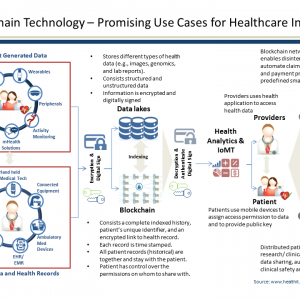Identity thefts, spamming and financial data crimes, the patient’s data can be misused for many reasons as patients don’t have control over their data.
2017 Ponemon Cost of Data Breach Study says that the cost of data breaches for healthcare organizations is estimated to be $380 per record.
Blockchain will have a considerable impact on a patient’s record sharing, billing, and medical research.
Read further to understand how a blockchain healthcare solution can be built to improve the management of the patient’s health record.
Though healthcare centers are adopting digital technologies, the patient’s medical records are currently stored in the centralized servers. It creates the attack surface for hackers. Accenture’s survey claims one in five employees working in the healthcare is willing to sell the sensitive medical data to the unauthorized parties.
Recently, Grindr dating app has disclosed user’s HIV status, sexuality, GPS position, and other personal details to third-parties. Sharing protected health information of patients without their consent can make them feel traumatized. Once the medical data of an individual is generated, data enrichment is done to make the data secure.
Saving data on blockchain doesn’t mean no-compliance. In fact, blockchain will make compliance enforcement more seamless and transparent. HIPAA (Health Insurance Portability and Accountability Act) Compliance ensures the protection of patient’ data. Healthcare vendor that deals with patient’s protected health information should follow HIPAA’s security measures.
HIPAA’s privacy rule allows all the involved members to access and disclose only de-identified data. It is essential that the compliance check is maintained before the health records get saved on the blockchain.
Blockchain can eliminate the risks associated with centralization of data by storing the digital health records across multiple nodes within the network. Even more on Healthcare blockchain, Healthcare units can directly query the blockchain: Unlike the traditional process, doctors or health insurance companies don’t need to approach a patient for accessing their health records. Healthcare institutes can submit their queries via APIs and access the patient’s non-identifiable information through smart contracts.
Smart contracts ensure the enforcement of the business rules, compliance requirement, and the user’s will before the data is shared or retrieved.
Stakeholders involved in the patient’s treatment can consume the stored data with the patient’s consent.
Smart contracts contain business logic about who gets what.
Insurance companies could only access the information related to billing and patient’s diagnostic reports, but no other details such as doctor’s notes or prescriptions.
Data Mining and AI in Healthcare Blockchain
For example, if a research company wants to get the analytics for HIV disease, smart contracts would enable them to access details like HIV type, most-affected city or country, age group, and gender while hiding the personal information of patients.
Here’s what benefits could Blockchain bring to the Healthcare Industry
Control over the data:
Anyone willing to access the health records would require the patient’s public key. Patients could seamlessly control who should access what data.
Since the data is saved in encrypted form, it remains unreadable to the hackers.
